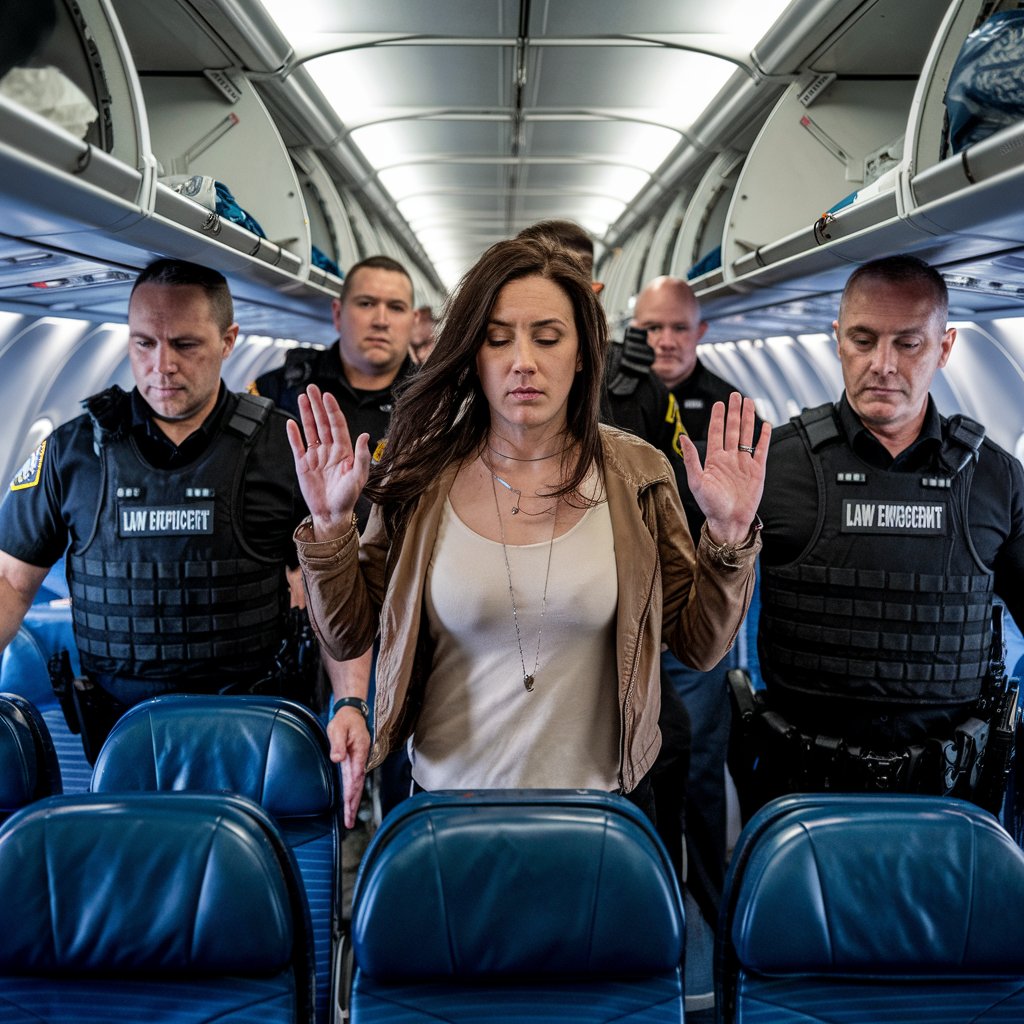In recent years, incidents involving disruptive passengers on flights have made headlines across the United States. One such incident involved Shari Ann Chinnis, an Indianapolis resident, whose behavior on a flight from Indianapolis to New York led to her arrest. This article delves into the details of the incident, the aftermath, and its broader implications. We’ll explore who Shari Ann Chinnis is, what transpired on that fateful flight, and what this incident tells us about the increasing number of unruly passengers on flights.
The Incident: What Happened on the Flight?
On a Friday evening, a routine flight from Indianapolis to New York took an unexpected turn when a passenger, identified as Shari Ann Chinnis, became disruptive. According to reports, Chinnis began exhibiting unruly behavior shortly after the plane took off. Her actions were so concerning that the flight crew felt it necessary to intervene, and ultimately, the pilot made the decision to return the plane to Indianapolis.
The details of the incident indicate that Chinnis’ behavior included shouting at other passengers and refusing to follow crew instructions. Her actions escalated to the point where the safety and comfort of other passengers were compromised. As a result, the decision was made to turn the plane around and land back in Indianapolis.
Upon landing, Shari Ann Chinnis was arrested by local authorities and removed from the flight. The other passengers were understandably shaken by the incident, but the flight was able to continue to its destination after the situation was resolved.
Who is Shari Ann Chinnis?
Shari Ann Chinnis is a resident of Indianapolis, Indiana. Little is known about her background or what may have led to her disruptive behavior on the flight. However, this incident has brought her into the public eye, raising questions about what might have caused such an outburst.
While specific details about Chinnis’ life remain private, the incident has sparked discussions about the increasing number of disruptive passengers on flights and the potential factors that contribute to such behavior.
The Aftermath: Legal and Social Consequences
Following her arrest, Shari Ann Chinnis faced legal consequences for her actions. Disrupting a flight is a serious offense, and in many cases, it can lead to significant fines, imprisonment, or both. The exact charges brought against Chinnis have not been widely publicized, but similar cases have resulted in charges ranging from disorderly conduct to interfering with a flight crew.
In addition to the legal consequences, Chinnis’ actions have also likely led to social repercussions. Being publicly associated with such an incident can have a lasting impact on one’s personal and professional life. This incident serves as a reminder of the importance of maintaining decorum while traveling, especially on flights where the safety and comfort of others are at stake.
The Broader Issue of Unruly Passengers on Flights
The incident involving Shari Ann Chinnis is not an isolated one. In recent years, there has been a noticeable increase in the number of unruly passengers on flights. According to the Federal Aviation Administration (FAA), reports of disruptive behavior on flights have surged, leading to more frequent interventions by flight crews and, in some cases, arrests.
Several factors may contribute to this trend. Increased stress levels, frustration with travel restrictions, and the pressures of modern life can all play a role in pushing passengers to behave inappropriately. Additionally, the confined space of an airplane, combined with the lack of control passengers have over their environment, can exacerbate feelings of anxiety and frustration.
How Airlines Are Addressing the Issue?
Airlines have been forced to adapt to the rising number of incidents involving unruly passengers. Many carriers have implemented stricter protocols for dealing with disruptive behavior, including training flight crews on de-escalation techniques and empowering them to make decisions that prioritize the safety of all passengers.
Some airlines have also begun to take a zero-tolerance approach to unruly behavior, resulting in immediate consequences for those who violate rules. This can include fines, bans from future flights, and even legal action.
The Impact on Other Passengers
Incidents like the one involving Shari Ann Chinnis can have a significant impact on other passengers. When a flight is disrupted, it not only causes delays but also creates a tense and uncomfortable atmosphere. Passengers who witness such behavior may experience heightened anxiety and stress, making their travel experience less enjoyable.
In some cases, passengers may feel compelled to intervene, either to help de-escalate the situation or to protect themselves and others. This can lead to further complications and, in some instances, put more people at risk.
Understanding the Legal Implications
Disruptive behavior on a flight is not just a violation of airline policies; it can also have serious legal consequences. Under U.S. law, interfering with a flight crew or disrupting the operation of an aircraft is a federal offense. Those found guilty of such actions can face hefty fines, imprisonment, or both.
In the case of Shari Ann Chinnis, her actions likely led to legal charges that could have a lasting impact on her life. It’s important for all passengers to understand the gravity of such behavior and the potential repercussions.
Preventing Unruly Behavior on Flights
Preventing incidents like the one involving Shari Ann Chinnis requires a multifaceted approach. Airlines, passengers, and regulatory bodies all have a role to play in ensuring that flights remain safe and enjoyable for everyone.
1. Airline Policies and Training
Airlines must continue to develop and enforce policies that address unruly behavior. This includes providing comprehensive training for flight crews on how to handle disruptive passengers and implementing clear procedures for managing such situations.
2. Passenger Responsibility
Passengers also have a responsibility to behave appropriately while traveling. This means following crew instructions, respecting the rights of other passengers, and managing their own stress and emotions during the flight.
3. Regulatory Oversight
Regulatory bodies like the FAA play a crucial role in setting standards for passenger behavior and holding individuals accountable for violations. Continued oversight and enforcement are necessary to deter disruptive actions on flights.
The Role of Mental Health in Unruly Behavior
Mental health issues can sometimes contribute to disruptive behavior on flights. Anxiety, panic attacks, and other mental health conditions can be exacerbated by the stress of travel, leading some individuals to act out in ways they wouldn’t normally.
It’s important for airlines to be aware of this and to provide support when possible. This could include offering resources for passengers who are struggling with anxiety or providing training for crew members on how to recognize and respond to mental health issues.
What to Do if You Witness Unruly Behavior?
If you find yourself on a flight where another passenger is behaving disruptively, it’s important to stay calm and follow the crew’s instructions. Here are some steps you can take:
- Stay Seated: Unless instructed otherwise, remain in your seat and avoid getting involved in the situation.
- Follow Crew Instructions: The flight crew is trained to handle these situations. Listen carefully to their instructions and cooperate fully.
- Avoid Escalating the Situation: If you are in close proximity to the disruptive passenger, try to remain calm and avoid actions that could escalate the situation.
- Report the Behavior: If you notice suspicious or concerning behavior before it becomes a problem, report it to the flight crew immediately.
The Future of Air Travel Safety
The incident involving Shari Ann Chinnis and other similar cases highlight the ongoing challenges faced by the airline industry in maintaining safety and order on flights. As air travel continues to evolve, it’s likely that airlines will need to implement even stricter measures to address unruly behavior.
Technology may also play a role in improving flight safety. From advanced surveillance systems to better communication tools for flight crews, there are numerous innovations on the horizon that could help prevent and manage disruptive incidents.
FAQs
1. Who is Shari Ann Chinnis from Indianapolis?
Shari Ann Chinnis is an Indianapolis resident who became known after being involved in a disruptive incident on a flight from Indianapolis to New York.
2. What happened on the flight involving Shari Ann Chinnis?
Shari Ann Chinnis became disruptive during the flight, leading the pilot to return the plane to Indianapolis, where she was arrested.
3. Why was Shari Ann Chinnis arrested?
She was arrested for her unruly behavior on the flight, which included disrupting the flight crew and passengers.
4. What are the legal consequences of disruptive behavior on flights?
Disruptive behavior on flights can result in fines, imprisonment, or both, depending on the severity of the actions.
5. How do airlines handle unruly passengers?
Airlines have protocols in place, including crew training and clear policies, to manage and de-escalate situations involving unruly passengers.
Conclusion
The incident involving Shari Ann Chinnis on a flight from Indianapolis to New York serves as a stark reminder of the challenges airlines face in maintaining order and safety on flights. As the number of disruptive passengers continues to rise, it’s crucial for airlines, passengers, and regulatory bodies to work together to prevent such incidents. By understanding the factors that contribute to unruly behavior and taking proactive steps to address them, we can ensure that air travel remains a safe and enjoyable experience for everyone.



